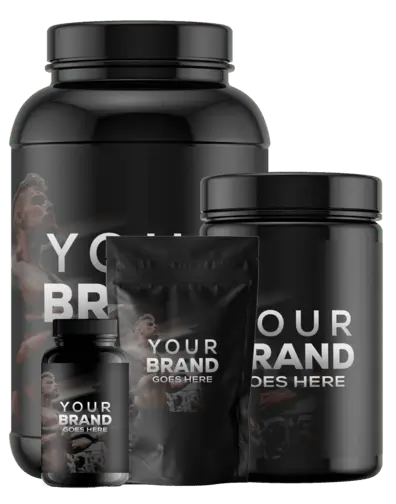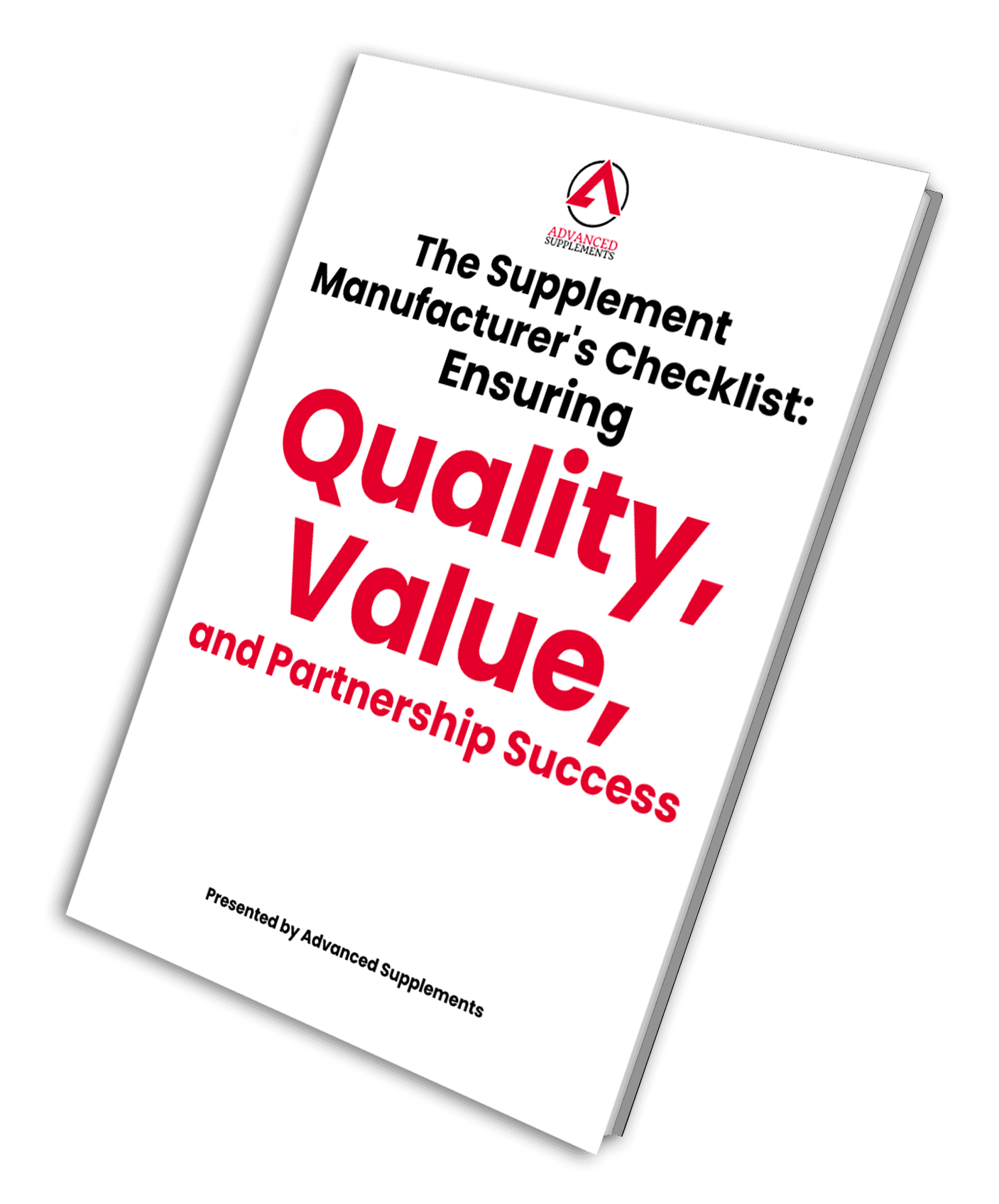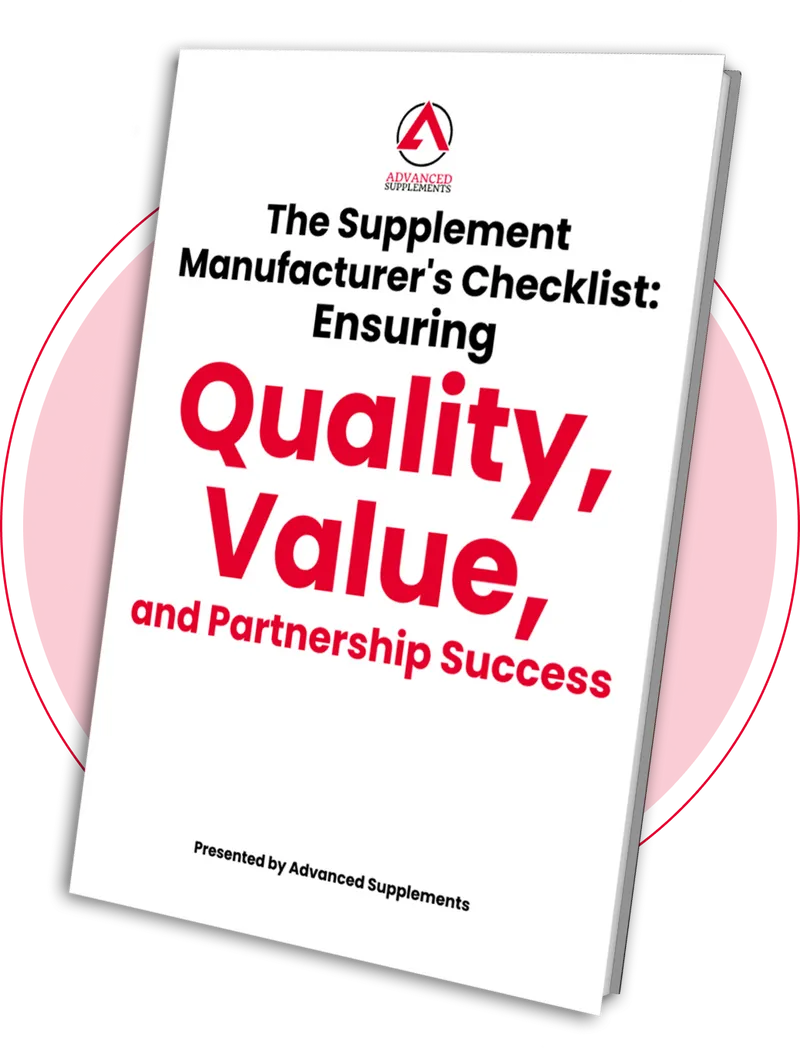The supplement industry reached $214.8 billion globally in 2025 and continues growing at 8.4% annually. However, over 60% of new supplement brands struggle to differentiate themselves in this crowded market. Most fail because they launch generic products that look exactly like dozens of competitors already on shelves.
Custom supplement manufacturer partnerships solve this problem by creating unique formulations that stand out and build loyal customer bases. This guide explains five key benefits of choosing custom manufacturing over private label alternatives for your supplement brand.
Struggling to stand out in the crowded supplement market? Partner with Advanced Supplements to create custom formulations that set your brand apart. Contact us today to start your custom manufacturing journey.
Benefits of Custom Supplement Manufacturing
Custom supplement manufacturing transforms your idea into a market-ready product through expert formulation, testing, and production, delivering benefits such as improved quality, faster turnaround, brand flexibility, and stronger market appeal.
1. Create Unique Formulations That Stand Out
The biggest advantage of working with a capsule manufacturing partner for custom formulations is complete control over your product. You choose every ingredient, dosage, and combination based on your target market needs rather than settling for generic formulas everyone else sells.
Research shows that 63% of U.S. supplement consumers value brands offering differentiated ingredients or proprietary blends. Generic multivitamins no longer satisfy informed consumers who research ingredients and compare products carefully before purchasing.
Custom formulation allows you to target specific health concerns that matter to your audience. Whether you focus on stress relief, athletic performance, beauty support, or digestive wellness, you can create products precisely matched to consumer needs. This targeted approach builds stronger brand loyalty and justifies premium pricing compared to commodity supplements.
You also gain exclusive ownership of your formulas. Nobody else can duplicate your exact product, which protects your market position and prevents direct price competition. This exclusivity becomes a valuable business asset as your brand grows and gains recognition.
2. Leverage Expert Formulation Support and Resources
Partnering with experienced manufacturers provides access to scientific expertise most emerging brands cannot afford to hire internally. These facilities employ food scientists, nutritionists, and regulatory experts who guide formulation decisions throughout development.
According to the Council for Responsible Nutrition, proper formulation requires understanding ingredient interactions, bioavailability factors, stability considerations, and regulatory compliance requirements. Professional guidance prevents expensive mistakes during product development.
Expert teams help optimize ingredient ratios for maximum effectiveness while keeping costs commercially viable. They understand which ingredients work synergistically and which combinations create stability problems or reduce absorption. This knowledge proves invaluable when developing products that actually deliver promised benefits.
Manufacturers also provide stability testing to determine accurate shelf life and expiration dates. Understanding stability testing in supplement manufacturing ensures your products maintain potency throughout their entire lifecycle. Without proper testing, products may degrade faster than expected, leading to customer complaints and regulatory issues.
Access to advanced equipment and technology represents another major benefit. Professional facilities use sophisticated blending systems, quality control instruments, and testing laboratories that cost millions of dollars. Individual brands cannot justify these investments, but partnering with established manufacturers provides immediate access to cutting-edge capabilities.
3. Adapt Products Based on Market Feedback and Trends
Market conditions change rapidly in the supplement industry. Consumer preferences shift, new ingredients gain popularity, and scientific research reveals better formulation approaches. Custom manufacturing provides flexibility to adapt quickly rather than remaining locked into outdated formulas.
The U.S. dietary supplements market is projected to reach $124.22 billion by 2033, growing at 7.7% annually. This growth is driven by evolving consumer demands for plant-based ingredients, clean labels, personalized nutrition, and innovative delivery formats. Brands using custom manufacturing can capitalize on these trends immediately.
For example, if your protein powder sells well but customers request a vegan option, custom manufacturers can reformulate using plant-based proteins while maintaining similar taste and texture profiles. Compare this with private label products where you cannot modify formulas at all.
You can also test new ingredients as they gain market traction. When adaptogens, postbiotics, or nootropics become popular, custom manufacturers help you incorporate these trending compounds into existing products or develop new formulations around them. Staying current with supplement trends for 2026 keeps your brand relevant and competitive.
Seasonal adjustments become possible too. You might create immune-focused formulas for fall and winter, then shift toward energy and outdoor activity formulations for spring and summer. This flexibility maximizes sales opportunities throughout the year.
4. Build Stronger Brand Identity and Customer Loyalty
Custom formulation enables you to tell a unique brand story that resonates with your target audience. Generic private label products offer no storytelling opportunities because dozens of brands sell identical formulas under different labels.
Your custom formulation becomes central to your brand narrative. You can explain why you chose specific ingredients, how your formula differs from competitors, and what benefits make your product superior. This narrative builds emotional connections with customers beyond simple transactional relationships.
Proprietary blends allow you to create recognizable product names and trademark specific formulations. This intellectual property protection strengthens your brand value and creates barriers preventing competitors from directly copying your success.
Customer loyalty increases when people believe your products are specifically designed for their needs rather than mass-market commodities. According to Grand View Research market analysis, consumers increasingly demand personalized nutrition solutions tailored to individual health goals and preferences.
The ability to modify formulas based on customer feedback further strengthens loyalty. When customers suggest improvements or request specific changes, you can actually implement these ideas with custom manufacturing. This responsiveness builds community around your brand and creates advocates who actively promote your products.
5. Achieve Better Profit Margins and Business Control
While custom manufacturing requires higher initial investment than private label alternatives, it delivers superior long-term profitability. Custom products command premium pricing because they offer unique value propositions that justify higher costs.
Generic private label supplements compete primarily on price since identical products are available from multiple brands. This race to the bottom erodes profit margins and makes sustainable business growth difficult. Custom formulations escape this trap by offering differentiation that supports healthy margins.
You also control ingredient sourcing decisions that impact quality and cost. Working with manufacturers, you can specify premium ingredient sources that support marketing claims or choose cost-effective alternatives that meet specifications without unnecessary expenses. Understanding variables that impact manufacturing costs helps optimize formulations for profitability.
Supply chain flexibility represents another business advantage. With custom manufacturing, you are not dependent on a single supplier for pre-made formulas. If one manufacturer cannot meet your needs, you can move production to another facility using your proprietary formula. This flexibility provides negotiating leverage and protects against supply disruptions.
Custom manufacturing also enables better inventory management through precise order quantities. Rather than buying predetermined batch sizes of private label products, you can manufacture exactly what your sales forecasts require. This reduces carrying costs and minimizes waste from expired or slow-moving inventory.
As your business scales, custom manufacturing grows with you. Manufacturers can increase production volumes while maintaining consistent quality and specifications. This scalability supports business expansion without requiring you to change partners or reformulate products.
Making Custom Manufacturing Work for Your Brand
Success with custom manufacturing requires selecting the right partner and approaching development strategically. Start by clearly defining your target market, desired product attributes, and business goals before contacting manufacturers.
Research potential partners thoroughly by checking certifications, reviewing client references, and evaluating their expertise in your product category. Look for manufacturers offering comprehensive services including formulation development, regulatory guidance, and quality testing.
Budget adequately for initial development because custom formulation requires investment in research, sampling, and stability testing. However, view these costs as building valuable intellectual property rather than simple production expenses.
Plan for longer development timelines compared to private label products. Custom formulation typically requires 3-6 months from concept to market-ready product. This includes formulation development, sample testing, adjustments based on feedback, and final production setup.
Consider starting with a focused product line rather than attempting to create multiple custom formulations simultaneously. Launching 1-2 carefully developed products allows you to test market response and refine your approach before expanding.Understanding different delivery formats helps you choose the best option for your formulation. Options include capsules, tablets, powders, gummies, and liquids. Each format has specific advantages depending on ingredients, target market, and positioning. Learning about gummies vs capsules comparisons helps inform these decisions.
Frequently Asked Questions
-
How much does custom supplement manufacturing cost compared to private label products?
Custom manufacturing typically costs 20-40% more initially due to formulation development, stability testing, and setup fees. However, custom products command premium pricing that offsets higher costs and delivers better long-term profit margins. Most brands recoup development expenses within 6-12 months of launching successful custom formulations.
-
What minimum order quantities should I expect for custom supplement manufacturing?
Minimum orders vary by manufacturer and product type but typically range from 2,500 to 10,000 units for initial custom production. Some manufacturers offer lower minimums for emerging brands testing market demand. As your brand grows and orders increase, per-unit costs decrease substantially through volume discounts.
-
Can I modify my custom formula after initial production runs?
Yes, custom manufacturing allows formula modifications based on customer feedback, cost optimization, or ingredient availability. Most manufacturers permit adjustments between production runs. Major formula changes may require additional stability testing and regulatory review, but minor tweaks like flavor improvements happen routinely.
-
How long does custom supplement formulation development typically take?
Development timelines usually require 12-16 weeks from initial concept to market-ready product. This includes formulation design, sample creation, taste testing, formula adjustments, stability testing, and final production setup. Rushing development often results in suboptimal products, so adequate time ensures quality outcomes.
-
What ownership rights do I have over my custom supplement formula?
You typically own full rights to your custom formula, though specific terms vary by manufacturer agreement. Most reputable manufacturers will not produce your exact formula for competitors. Review contracts carefully to ensure you retain intellectual property rights and can move production to different facilities if needed.




